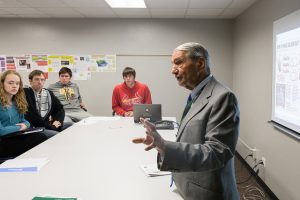Hoover Students Get Lesson from World Food Prize Laureate

Dr. Gurdev Khush, the 1996 World Food Prize laureate, speaks with students in the Hoover STEM Academy.
Renowned agronomist and World Food Prize Laureate ’96 Dr. Gurdev Khush was impressed. Touring the STEM Academy facilities at Hoover High School Wednesday morning he kept nodding and smiling.
He’s in town for this year’s edition of the annual World Food Prize festivities, reuniting and hobnobbing with fellow laureates the way old football teammates do at class reunions – sort of. Except instead of rehashing old glories they’re no longer capable of this distinguished fraternity huddles up to talk strategy in the never-ending fight against world hunger.
When Dr. Khush dropped in on first-year teacher Tiffany Roby’s class at Hoover he seemed surprised when she told him that her students are in the process of submitting formal research proposals and that some of them have been rejected. It sounded pretty collegiate.
He wanted to know if any Hoover students are involved with the World Food Prize Foundation’s Borlaug-Ruan Youth Institute. Later he would meet senior Corbin Faidley who, under the guidance of teacher Mike Blair, has prepared a paper on food security in Niger that he’ll be presenting later this week. That could lead to a prestigious Borlaug-Ruan international internship which provides high school students an all-expenses-paid, eight-week hands-on experience working with world-renowned scientists and policymakers at leading research centers around the globe.
Each year exceptional high school students from across the United States and other countries are selected to participate in the three-day Global Youth Institute that’s included in the WFP schedule of events.
Selected students and their teacher mentors interact and discuss agricultural issues with international experts like Dr. Khush who was awarded the World Food Prize for his achievements in greatly increasing the global supply of rice during a time of exponential population growth. Like Iowa’s own famed grain geneticist Dr. Norman Borlaug, Dr. Khush is considered one of the giants of the Green Revolution.
Following his tour Dr. Khush spoke to a cohort of STEM students in the school auditorium. He recited lots of daunting statistics and facts that framed the scope of hunger around the globe; past, present and into the foreseeable future: “Only 3% of the world’s water supply is freshwater…every one degree increase in average overnight low temperatures during growing seasons reduces crop yield by 10%…45% of child deaths globally are due to malnutrition…”etc.
But the most directly relevant things he had to say to the high school students that were his audience on this particular day concerned not the global to-do list, but his own upbringing and education. Dr. Khush grew up in a small village in Punjab, India.
“We didn’t have desks or electricity in some of the schools when I was a boy,” he recalled. “But we had the desire.” He encouraged the students to take advantage of the opportunities before them. “ I have not seen facilities like these for students your age in the United States,” he said after checking out the recently redesigned classroom that was overhauled with a grant from the Governor’s STEM Advisory Council, going on to tell the students that Dr. Borlaug had a passion for training students to follow in his footsteps.
Having done so much to fill so many empty stomachs, Dr. Khush now seeks, ironically, to instill a hunger in young people; one for knowledge and solutions. So no wonder he dropped by Hoover’s STEM Academy while he was in town. It’s just his kind of place.




